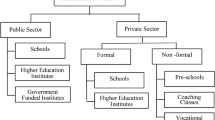Abstract
Education is on concurrent list in India and so, is not for profit. Private participation in higher and technical education has been in existence ever since the modern education system developed in India. In past it was more for philanthropy and fulfillment of inner needs of kings, industrial houses who donated the land for promotion of education and helped in setting up of BHU, AMU, TISS, TIFR, ISS etc. As the aspiration of society for professional education increased while the public sector had limited access, sensing the business opportunity large number of entrepreneurs and business houses had worked meticulously to exploit the situation, while some offered access, some quality education and most offer run of the mill education to milk the cash cow. We have witnessed lot of changes in higher education sector in the last two decades, the public as well as private institutions are undergoing change but they also have to maintain continuity for growth, innovation, technology etc. The present paper had applied Interpretive Structuring Model to study the continuity and change forces in Education Sector the model has lot of policy implication for planner and implementers in Education Sector.
Similar content being viewed by others
References
Bhat J. (2010), Managing Innovation: Understanding How Continuity and Change Are Interlinked, Global Journal of Flexible Systems Management, 11(1and2), 63–74.
Cronbach L. J. and Meehl P. (1955), Construct Validity In Psychological Tests, First published in Psychological Bulletin, 52, 281–302.
Gummesson E. (2000), Qualitative Methods in Management. California: Sage Publications, Inc.
Kothari C. R. (1985), Research Methodology-Methods and Techniques, New Delhi, Wiley Eastern Limited.
Nasim S. (2011), Total Interpretive Structural Modeling of Continuity and Change Forces in E-Government, Journal of Enterprise Transformation 1(2).
Nasim S. and Sushil (2011), Revisiting Organizational Change: Exploring the Paradox of Managing Continuity and Change, Journal of Change Management.
Nasim S., Sushil and Singh P. P. (2008), Flexible Strategy for Managing Change & Continuity - Modeling the factors in E-government Domain, Proceedings of the Eighth Global Conference on Flexible Enterprise for Global Business, USA, Held on 14th - 16 June, 2008.
Sahney S., Banwet D.K. and Karunes S. (2006), An Integrated Framework for Quality in Education: Application of Quality Function Deployment, Interpretive Structural Modeling and Path Analysis, Total Quality Management and Business Excellence, 17(2) 265–85.
Singh M. D., R. Shankar, R. Narain and A. Agarwal (2003), An Interpretive Structural Modeling of Knowledge Management in Engineering Industry, Journal of Advances in Management Research, 1(1), 28–40.
Srivastava S. and Fry R. E. (Ed) (1992), Executive and Organizational Continuity: Managing the Paradoxes of Stability and Change, Jossey-Bass, San Francisco.
Sushil (2005), A Flexible Strategy Framework for Managing Continuity and Change, International Journal of Global Business and Competitiveness, 1(1), 22–32.
Sushil (2005a), Interpretive Matrix: A Tool to Aid Interpretation of Management and Social Research, Global Journal of Flexible Systems Management, 6(2), 27–30.
Sushil (2005b), A Flexible Strategy Framework for Managing Continuity and Change, International Journal of Global Business and Competitiveness, 1(1), 22–32.
Sushil (2009), Iterpreting the Interpretive Structural Model, Working paper, IIT Delhi
Thorat (2006), Higher Education in India: Emerging Issues Related to Access, Inclusiveness and Quality, Nehru Memorial Lecture.
Author information
Authors and Affiliations
Corresponding author
Additional information
Gp Capt UC Prasad completed his B. Tech from BIT, Ranchi University and was commissioned as an Air Force Officer, where he served the nation for 29 years in various capacities, being an Aeronautical Engineer (Electronics). During his tenure, he completed his M.Tech. from IIT, Delhi in Systems Management. He also worked as an Instructor with Air Force Technical Collage and other Institutes of IAF. Further, He did Executive Management from MDI Gurgaon. After his retirement, he was working as the Director- Academics with an Engineering and Management Institute. He has submitted his PhD thesis in IIT Delhi in July 2011. He is also a fellow of Institutions of Engineers (India) and IETE. Presently he is director of Keystone group of Institute an Engineering and Management Institute.
Prof. R K Suri is MBA and PhD from University of Delhi; he has very diversified and distinguished academic record. He is ex-Scientist CSIR, former Head, Educational Consultants India Limited, GOI. He has been instrumental as project manager for setting up of 23 IIITs, 7 central universities, 3 IIMs. Dr Suri has been instrumental to setup Rajeev Gandhi Institute of Petroleum Technology, at par with IIT Rae Bareli, as founder Executive Director. Has been the Founder Vice Chancellor-DG, at Moand University, UP. He is being sought after as strategic education & management consultant for setting up, branding, collaboration and expansion of educational institution. Prof Suri has been teaching at leading B-schools and is a visiting faculty to IIT, IIM,, ISM, University of Applied Science Mainz, Germany. Dr. Suri is former VC( Director General) of Monad University (project), advisor APG University, Simla (project), Russel Group University from UK. Advisor UPES, Dehradun etc. He is advisor to number of leading private higher educational institutions in India and abroad. He has set up institutions in Bangladesh, Nepal, Mauritius, Tanzania, Rwanda, and Srilanka. He is Director P R Edu Media Pvt Ltd. He is also the Chairman of Global Development Foundation, Delhi, India. Dr Suri is President of Institute of Chartered Management, Delhi.
Rights and permissions
About this article
Cite this article
Prasad, U.C., Suri, R.K. Modeling of Continuity and Change Forces in Private Higher Technical Education Using Total Interpretive Structural Modeling (TISM). Global J. Flexible Syst. Manage. 12, 31–39 (2011). https://doi.org/10.1007/BF03396605
Published:
Issue Date:
DOI: https://doi.org/10.1007/BF03396605




